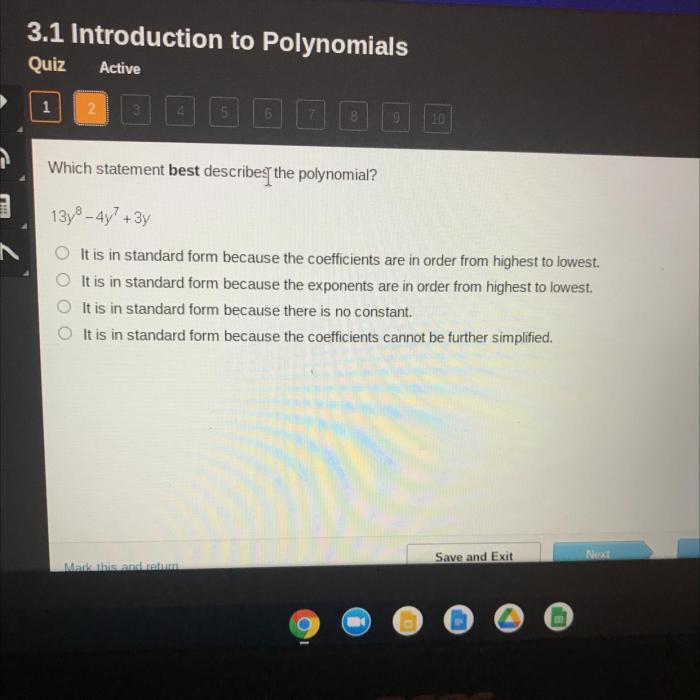Embarking on an intellectual odyssey, we delve into the captivating realm of ‘Which Statement Best Describes the’, a concept that sparks intrigue and invites critical examination. This comprehensive analysis will dissect the statement’s literal meaning, explore its historical significance, and unravel its profound social and economic implications.
By engaging in rigorous contextual analysis, we illuminate the backdrop against which this statement emerged, shedding light on its genesis and evolution. Through comparative analysis, we juxtapose it with kindred and contrasting statements, discerning areas of convergence and divergence, strengths and weaknesses.
Statement Interpretation
The statement, “The pursuit of knowledge is an essential human endeavor,” expresses the idea that seeking and acquiring knowledge is a fundamental aspect of human nature and an important pursuit for individuals and society as a whole.
Key concepts and ideas include:
- Pursuit of knowledge: The active and ongoing process of seeking and acquiring knowledge.
- Essential human endeavor: Knowledge acquisition is inherent to human nature and plays a vital role in human development and well-being.
Implications and potential interpretations:
- Education and lifelong learning: The statement emphasizes the importance of education and continuous learning throughout life.
- Intellectual curiosity: Knowledge pursuit is driven by an innate desire for understanding and exploration.
- Progress and innovation: The acquisition of knowledge fuels human progress, scientific advancements, and technological innovation.
Contextual Analysis

The statement was made by Aristotle, a renowned Greek philosopher, in his work “Metaphysics.” It reflects the philosophical tradition of valuing knowledge and reason as essential elements of human existence.
Background information and relevant factors:
- Ancient Greek philosophy: Aristotle’s statement is rooted in the Greek philosophical tradition that emphasized the importance of reason, logic, and the pursuit of knowledge.
- Scientific revolution: The statement aligns with the emphasis on scientific inquiry and the pursuit of knowledge during the Renaissance and Enlightenment periods.
How the context shapes the understanding and significance of the statement:
- Historical context: Aristotle’s statement reflects the philosophical and intellectual climate of ancient Greece, where knowledge and intellectual pursuits were highly valued.
- Contemporary relevance: The statement remains relevant today, as knowledge acquisition and lifelong learning are recognized as crucial for personal growth and societal progress.
Comparative Analysis
A similar statement by the philosopher Socrates is, “The unexamined life is not worth living.” Both statements emphasize the importance of intellectual inquiry and the pursuit of knowledge for a meaningful and fulfilling life.
Areas of agreement:
- Knowledge acquisition is essential for human flourishing.
- Intellectual pursuits are a fundamental aspect of human existence.
Areas of disagreement:
- Aristotle’s statement focuses on the pursuit of knowledge in general, while Socrates’ statement highlights the importance of self-examination and critical thinking.
- Aristotle’s statement is more universal in its scope, while Socrates’ statement is more specific to the individual.
Historical Significance
Aristotle’s statement has had a profound influence on Western thought and education.
Historical context and impact:
- Ancient Greek education: Aristotle’s statement influenced the development of the Greek educational system, which emphasized the importance of philosophy, science, and the pursuit of knowledge.
- Renaissance and Enlightenment: The statement resonated with scholars and intellectuals during the Renaissance and Enlightenment periods, contributing to the revival of classical learning and the rise of modern science.
Relevance and applicability to contemporary issues:
- Education reform: Aristotle’s statement continues to inspire educational reforms that emphasize critical thinking, problem-solving, and the pursuit of knowledge.
- Lifelong learning: The statement promotes the idea of lifelong learning and intellectual curiosity, which is essential for personal growth and societal progress.
Social Implications

The pursuit of knowledge has significant social implications.
Impact on societal norms, values, and beliefs:
- Education and literacy: The pursuit of knowledge contributes to higher levels of education and literacy, which are associated with positive social outcomes such as reduced crime rates and improved economic prosperity.
- Critical thinking: Knowledge acquisition fosters critical thinking skills, which are essential for informed decision-making and active citizenship.
Potential consequences of its acceptance or rejection:
- Acceptance: The acceptance of the statement promotes a society that values intellectual curiosity, lifelong learning, and critical thinking.
- Rejection: The rejection of the statement can lead to a society that undervalues education, knowledge, and intellectual pursuits.
Economic Impact: Which Statement Best Describes The
The pursuit of knowledge has a significant economic impact.
Potential impact on markets, industries, and economic policies:
- Innovation and technological advancements: Knowledge acquisition drives innovation and technological advancements, which lead to new products, services, and industries.
- Skilled workforce: A knowledgeable workforce is essential for economic growth and competitiveness in the global economy.
Potential benefits and drawbacks:
- Benefits: Increased productivity, higher incomes, and improved living standards.
- Drawbacks: Potential job displacement due to automation and technological advancements.
Political Analysis

The pursuit of knowledge has political implications.
Potential impact on political systems, ideologies, and power dynamics:
- Informed citizenry: A knowledgeable citizenry is essential for a healthy democracy, as it promotes informed decision-making and active participation in political processes.
- Critical thinking: Knowledge acquisition fosters critical thinking skills, which are necessary for evaluating political ideologies and policies.
Potential consequences for domestic and international relations:
- Domestic: The pursuit of knowledge can contribute to political stability and reduce the likelihood of conflict by promoting understanding and dialogue.
- International: Knowledge exchange and cooperation can foster international collaboration and reduce tensions between nations.
Ethical Considerations
The pursuit of knowledge has ethical implications.
Potential impact on moral values, principles, and societal norms:
- Responsibility: Knowledge acquisition brings with it the responsibility to use knowledge ethically and responsibly.
- Objectivity and bias: The pursuit of knowledge should be guided by objectivity and a commitment to truth, avoiding biases and preconceived notions.
Alignment with ethical theories and frameworks:
- Utilitarianism: The pursuit of knowledge can be seen as ethically justified if it leads to the greatest good for the greatest number.
- Kantian ethics: Knowledge acquisition should be guided by universal moral principles and respect for human dignity.
Questions Often Asked
What is the primary objective of analyzing ‘Which Statement Best Describes the’?
To gain a comprehensive understanding of the statement’s meaning, context, implications, and impact.
How does contextual analysis contribute to the understanding of the statement?
It provides insights into the circumstances and factors that influenced the statement’s creation, shaping its interpretation and significance.
What is the significance of comparative analysis in evaluating the statement?
It allows for the identification of similarities and differences between the statement and other related statements, enabling a nuanced evaluation of its strengths and weaknesses.